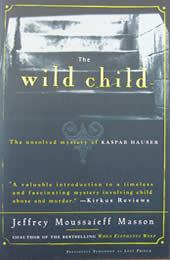The Wild Child
The Unsolved Mystery of Kasper Hauser

Kept in a dungeon for his entire childhood, Kasper Hauser turned up in Nuremberg in 1828 when he was sixteen, barely able to talk or walk, a "wild child." Within a few years, his gentleness, simplicity, and profundity captured the interest of all Europe. Hauser was murdered just a few years later, in 1833.
Who was Kaspar Hauser? Was he German royalty as many have believed? Why was he kept in a dungeon all those years, and who murdered him? Jeffrey Masson, whose work on the reality of child abuse in Freud's time created an explosion in the world of psychoanalysis, has discovered the earliest document on the Kaspar Hauser story - George Friedrich Daumer's notes of Kaspar Hauser's first two years in Daumer's house, long thought to be lost.
On the basis of these notes and other documents, some previously unpublished, Masson provides the first complete English translation of one of the great works of German literature, Anselm von Feuerbach's story of Kaspar Hauser. Along with this translation, Masson includes a lengthy essay in which he explores many of the fascinating issues raised by the case. In this essay, Masson not only sheds light on Kaspar Hauser's identity and murder, but also provides new insights concerning language development, man's innate nature, and the long-term effects of trauma and abuse.
